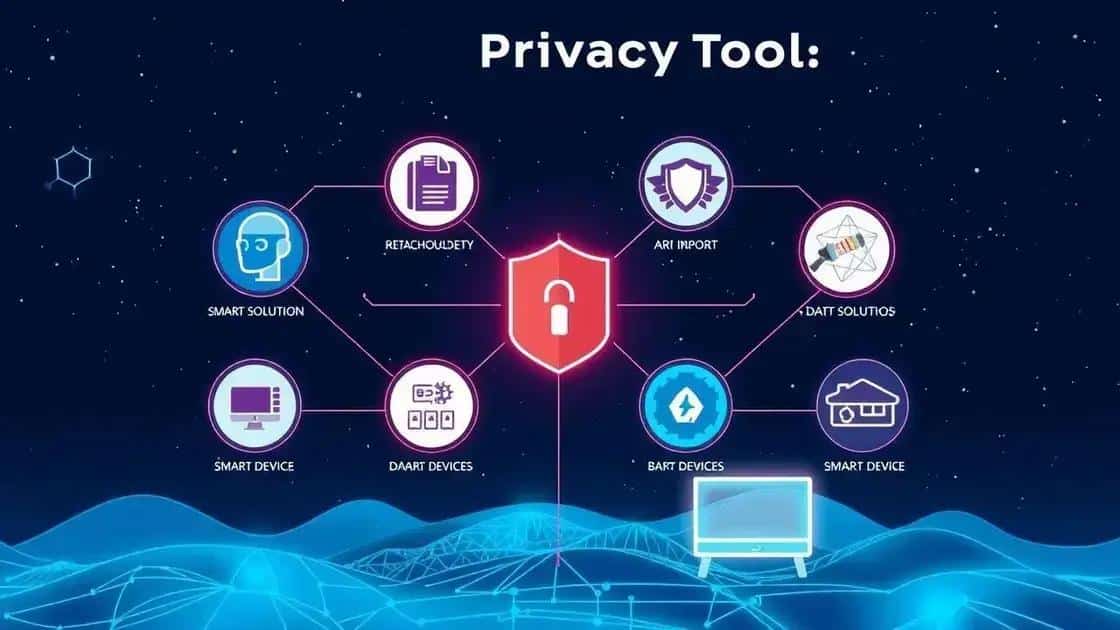Digital privacy tools 2025 – emerging trend

Digital privacy tools 2025 focus on advanced security features like AI-driven protection, decentralized solutions, and personalized privacy settings to safeguard users’ online data effectively.
Digital privacy tools 2025 are becoming essential as our online life grows. Have you ever wondered how to effectively safeguard your data in this digital age? Let’s dive into the latest trends.
Understanding digital privacy tools
Understanding digital privacy tools is crucial for anyone navigating the online world today. As data breaches and online threats grow, being informed about the tools available to protect your information is more important than ever.
Knowing the basics of these tools can help you feel more secure online. Let’s delve into some key features that make these tools essential.
Key Features of Digital Privacy Tools
Digital privacy tools offer several important functions that can enhance your security:
- Data encryption: This feature protects your information, ensuring that only you can access it.
- Secure connections: Tools often use VPNs to create a safe browsing experience.
- Ad blockers: These help limit intrusive ads and trackers from monitoring your activity.
- Anonymity: Many tools mask your IP address to keep your online presence private.
The importance of understanding these features cannot be overstated. Each tool is designed to tackle specific privacy threats. For instance, using a VPN can safeguard your data even on public Wi-Fi networks.
Additionally, awareness of current trends in these tools can keep you one step ahead of potential risks. More companies are focusing on user-friendly designs that enhance privacy without compromising usability.
Staying informed about emerging digital privacy tools can guide you in making better choices about your online presence. As privacy becomes a pressing issue, understanding these tools today can help you navigate the digital landscape more safely in the future.
Key features of emerging digital privacy tools

When exploring the key features of emerging digital privacy tools, it’s essential to recognize how these features improve your online safety. Understanding these aspects can help you make informed decisions about protecting your personal information.
Many digital privacy tools offer robust capabilities to safeguard your data. For example, features like encryption ensure that your information remains private and secure from unwanted access.
Prominent Features You Should Know
Here are some of the most impactful features that digital privacy tools typically provide:
- Multi-factor authentication: This adds an extra layer of security, making it harder for unauthorized users to access your accounts.
- Anonymization: Some tools can hide your identity online, making it difficult for anyone to trace your activities back to you.
- Real-time threat monitoring: Many tools alert you to potential security risks as they happen, allowing you to take quick action.
- Customizable privacy settings: Users can personalize their level of privacy, choosing what information to share and with whom.
With these features in place, users can feel more secure while navigating the web. The ability to control your privacy settings is particularly important in this digital age. It empowers individuals to manage their online presence actively.
Moreover, understanding how these features work can lead to better practices when using the Internet. Learning about updates and changes in the landscape of digital privacy tools keeps users informed about what’s available.
Ultimately, as technology evolves, so do the features of these privacy tools. Staying aware of the latest innovations will enhance your ability to protect sensitive information.
How to choose the right privacy tool for you
Choosing the right privacy tool can feel overwhelming due to the many options available today. By understanding what factors to consider, you can select a tool that best suits your needs.
Start by evaluating your main goals for online privacy. Do you need protection from hackers, or are you looking to anonymize your browsing? Clarifying your needs is the first step in finding the best fit for you.
Factors to Consider
When exploring your options, keep these essential factors in mind:
- Type of protection: Some tools focus on data encryption, while others prioritize anonymity. Determine which type aligns with your goals.
- User-friendliness: Look for a tool that is easy to navigate, especially if you’re not tech-savvy.
- Compatibility: Ensure the tool works well with your devices, whether it’s a smartphone, tablet, or computer.
- Cost: Consider your budget. Many effective privacy tools offer free versions, but sometimes a paid version is worth the investment for additional features.
Reading reviews and seeking recommendations can also guide your selection. Friends or trusted sources can provide insights based on their experiences. Additionally, checking for any known issues with the tool can save you time and frustration.
As you evaluate potential choices, don’t forget to explore the reputation of the company behind the tool. A transparent provider with a commitment to user privacy can make a significant difference in your experience.
Testing a tool with a free trial can offer valuable hands-on experience. This allows you to see if it meets your expectations before making any long-term commitments.
Future trends in digital privacy tools

As we look ahead, understanding future trends in digital privacy tools is essential for staying ahead of privacy threats. Technology is constantly evolving, and with it, the solutions to protect our online presence.
One of the most significant trends is the rise of advanced artificial intelligence in privacy protection. AI can analyze patterns in data and identify potential threats much faster than a human. This can lead to more effective security measures and personalized user experiences.
Key Trends to Watch
Several key trends are emerging in the realm of digital privacy tools:
- Decentralized solutions: More tools are adopting decentralized technologies, reducing reliance on central servers and enhancing user control over their data.
- Integration with smart devices: As the Internet of Things (IoT) grows, privacy tools will increasingly need to protect data generated by connected devices.
- Regulatory compliance tools: With evolving data protection laws, tools that help users comply with regulations like GDPR or CCPA will become vital.
- Focus on user education: Many companies are shifting towards educating users about privacy risks and best practices, empowering individuals to manage their online safety.
The emphasis on user privacy is turning into a competitive advantage for many businesses. Organizations are recognizing that offering robust privacy tools can enhance consumer trust and loyalty. Users are becoming more aware of their data rights, and companies must adapt to maintain credibility.
As these trends develop, it’s crucial to remain informed about the tools that emerge. Keeping abreast of advancements in digital privacy tools will help users make better choices for their online safety.
FAQ – Frequently Asked Questions about Digital Privacy Tools
What are digital privacy tools?
Digital privacy tools are software solutions that help protect your personal data and online activities from unauthorized access and tracking.
How can I choose the right privacy tool?
To choose the right privacy tool, consider factors like type of protection, ease of use, device compatibility, and costs.
What features should I look for in a privacy tool?
Look for features like data encryption, multi-factor authentication, anonymity, and real-time threat monitoring.
Are there free options for digital privacy tools?
Yes, many effective digital privacy tools offer free versions with essential features, but premium versions may provide additional protections.





